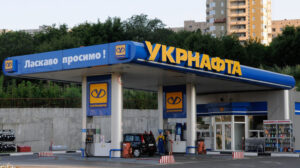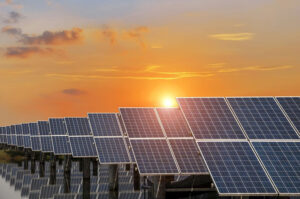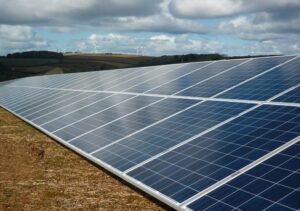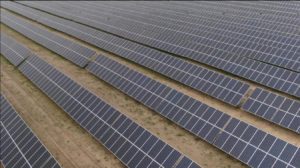
PJSC Ukrnafta is implementing six projects for gas piston and gas turbine units with a capacity of 420 MW and plans to build a CCHP (Combined Cooling, Heating, and Power, i.e., the production of electricity, heat, and cold from a single source – IF-U) system with a capacity of 250 MW, according to the company’s acting director, Yuriy Tkachuk.
“Our portfolio consists of 420 MW of generating capacity. These are six large projects that combine gas piston and gas turbine technologies. And we will build a large 250 MW CCHP project. All the assets we aim to install will be installed in 2026,” Tkachuk said during a panel discussion on investing in energy sustainability and recovery in Ukraine as part of URC-2025 in Rome on Wednesday, according to an Interfax-Ukraine correspondent at the event.
According to him, all capacities are renewable and are being installed in central, eastern, and western Ukraine, and electricity will be generated using associated gas from production.
“In this way, we will support our energy system through these projects,” Tkachuk said.
He added that after Ukrnafta was transferred to the state in 2022, “we began to develop its new history.”
As Tkachuk emphasized, Ukrnafta currently provides 99% of petroleum product supplies to the Ministry of Defense, and despite this, it has launched a new direction, namely electricity production, which is very important in the context of the significant destruction of Russia’s energy capacities.
“Thanks to international financial institutions, Norway, Sweden, Germany, our state, and the government, we have launched a distributed power generation project,” the head of Ukrnafta emphasized.

Ukraine needs to implement in the next 5-10 years a number of projects to increase the capacity and flexibility of the energy system, the volume of investments in which will amount to about $15 billion, the chairman of the board of the NEC Ukrenergo Volodymyr Kudrytskyy said.
“There will be countless more winters to come. And our crazy neighbor will not go anywhere from us. So we need to think not only about this winter, but also about the future. That is why we, as a system operator, have a calculated vision of what the optimal energy mix of our country will be for 5-7-10 years, what we should build to secure our facilities from massive shelling, and also to make the energy mix cheaper and cleaner. There is a certain investment menu,” Kudrytskyy said at a briefing at the Media Center in Kyiv on Friday.
According to him, the best defense for Ukrainian generation is dispersal of facilities, as well as their construction according to new technologies and green transition principles, without using expensive fuels like gas and coal.
According to his presentation, Ukraine will require 1.4 GW of new highly maneuverable thermal power plants in the coming years (now 0 GW), as well as 1.1 GW of biofuel-fired thermal power plants (now 0.3 GW). In addition, 3.8 GW of SES (now 6.2 GW), 4.5 GW of WPP (now 0.5 GW) and 0.8 GW of Energy Storage (now 0 GW) are to be added. At the same time, 2 GW of capacity is to be built at Dniester and Kanev HPPs (now 2 GW).
According to rough estimates, this will require $15 bln, of which the most can be invested in WPP – $5.4 bln. SES will cost $2.5 bln, TPP (both types) – $2.3 bln, SNPP – $1.2 bln, SHPP – $3.7 bln.
During the briefing, he added that additional nuclear power plant capacity would also be needed, expressing hope for the return of the Russian-occupied ZNPP.
“There are reserves to increase generation at existing NPPs, plans to build new units. They are long-term, but nuclear electricity will be in demand, especially when the withdrawal of coal-fired thermal power plants from the balance,” Kudrytskyy explained.
He pointed out that Ukrenergo made calculations with the help of specialized software to get a vision “how to build such a system, which would be ready at any time to meet the demand of consumers and be the cheapest of all such systems”.
At the same time, the head of the company emphasized that the calculation should be based on private investment.

The German authorities intend to support bilateral energy projects with Ukraine and will dedicate the funding of $70 million for this, according to a joint statement by Washington and Berlin on the Nord Stream 2.
“Germany will continue to support bilateral energy projects with Ukraine, especially in the field of renewables and energy efficiency, as well as coal transition support,” the document says.
Germany, among other things, “will appoint a special envoy with dedicated funding of $70 million.”
In addition, Germany is also ready to launch a Ukraine Resilience Package to support Ukraine’s energy security. Berlin will provide assistance for Ukraine’s integration into the European electricity grid, support efforts to reform Ukraine’s energy sector, and assist with identifying options to modernize Ukraine’s gas transmission systems.

The Dutch company Bontrup plans at the first stage to invest EUR 50 million in energy projects in the Chornobyl exclusion zone as part of the implementation of the concept of Ukraine’s “green” energy transition, the Economy Ministry reported.
According to the report, Bontrup representatives discussed this proposal during a meeting with First Deputy Prime Minister-Minister of Economy Oleksiy Liubchenko, Deputy Minister Iryna Novikova, as well as with Acting Head of the State Agency on Energy Efficiency and Energy Saving Kostiantyn Hura and Head of the State Agency on Exclusion Zone Management Serhiy Kostiuk.
“The parties discussed the proposal of the Bontrup representatives on the implementation of an investment energy project on the territory of the Chornobyl exclusion zone as part of the implementation of the concept of a “green” energy transition in Ukraine,” the ministry said.
Bontrup also estimates the prospect of increasing the volume of investments at EUR 1.5 billion. According to the initiators, the implementation of the project will provide jobs for about 10,000 households, the ministry said.

Kernel, one of the largest Ukrainian agricultural groups, will channel $170 million in the implementation of alternative energy projects.
The agricultural group said on its Facebook page on Friday that a green energy turbine with a capacity of 7.5 MW operates to its full capacity at the oil crushing plant in Kropyvnytsky.
“Six more Kernel’s plants operate in the same format until 2021 and generating a total of 90 MW. In particular, Starokostianstyniv oil crushing plant, which is being constructed in Khmelnytsky region, will become the largest modern oil crushing plant in Ukraine,” Kernel said.
According to the group, Starokostianstyniv oil crushing plant will have a turbine with a capacity of up to 20 MW.

VR Capital Group (the United States), an alternative asset manager specializing in global emerging markets, has acquired the remaining stake in alternative energy projects jointly developed with ICU independent asset management, ICU reported on its website.
According to the report, deal covers green energy facilities in Kamyanets-Podilska solar plant (64 MW) in Khmelnytsky region, Solar Capital energy company (35 MW) in Kherson region and a number of small stations in Mykolaiv region (with a total capacity of 127 MW).
Terms of the transaction were not disclosed.
The ICU only said the transaction has been approved by the Antimonopoly Committee of Ukraine on July 4, 2019.
“I am still confident that these assets are in good hands and that the key alternative energy sector in Ukraine is positioned to attract further large foreign investments. We see a great potential in our economy and we continue our work with international investors,” said ICU managing partner Makar Paseniuk.
He said that VR Capital has been a visionary among western investors in understanding the enormous potential of Ukraine and being ready to support the country even during difficult times.
VR Capital Group Ltd., through its principal subsidiaries including VR Advisory Services Ltd (together, VR Capital Group) is an alternative asset manager with assets under management in excess of $4.5 billion. VR Capital Group’s external client base is primarily composed of institutional investors from the United States and Western Europe, including university endowments, charitable foundations, family offices and institutional asset allocators.
Founded in 2006, ICU is Ukraine’s leading asset manager with over $500 million in assets under management. Managing Partners Makar Paseniuk and Konstantin Stetsenko are majority shareholders of ICU.
ALTERNATIVE, DEVELOPED, ENERGY PROJECTS, ICU'S, SHARE, US VR CAPITAL